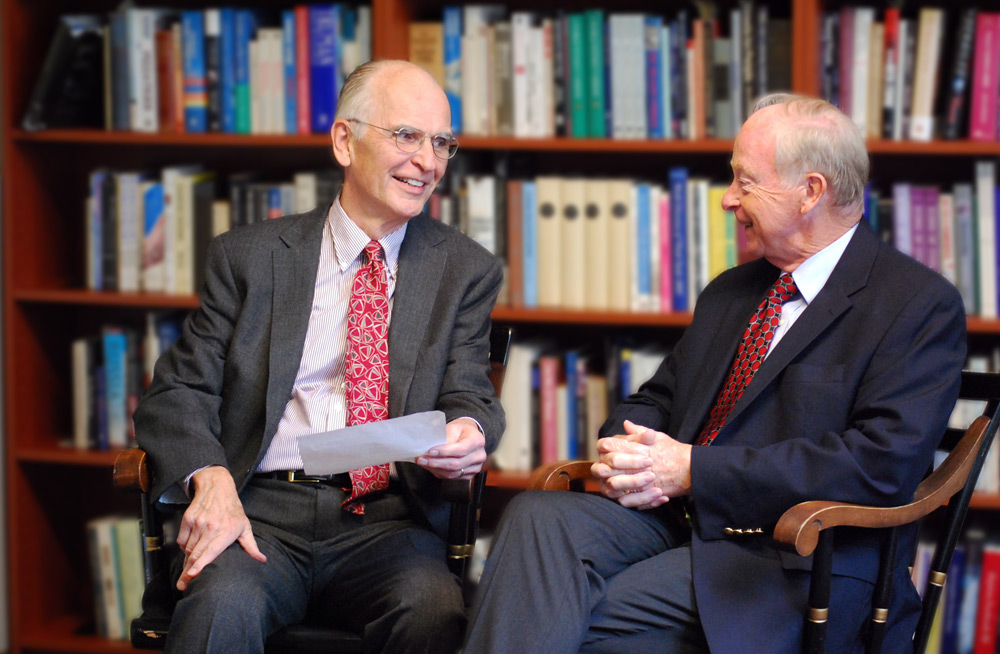Conservatives and the Language of Politics
by Hans Zeiger (for John Jay Institute) http://www.centerforajustsociety.org/speaking-the-language-of-america/
by Hans Zeiger (for John Jay Institute) http://www.centerforajustsociety.org/speaking-the-language-of-america/
Pope Francis’ already famous prophetic warnings to the Curia this week seem to some (maybe some in the Curia, for example) like a strange kind of season’s greeting. Some Christmas Party he gave them! Where’s the cheer? But if you remember that his message was preached while still in the Church season of Advent, not in the season of Christmas, you’ll see that it was appropriate, indeed.
Tomorrow is Christmas Eve,and as one ponders the lessons of the four weeks of Advent, he remembers John the Baptist crying the in wilderness, “Make straight the path of the Lord.” The predictions of Isaiah. God’s promises to David. The Annunciation and the Magnificat of Mary. December, for the Church, is not the season of shopping, but of waiting, listening and reflecting. It is penitential, though maybe not as much as Lent. For liturgical Christians the joy of Christmas begins tomorrow night and lasts through Three Kings Day (the Epiphany), January 6.
What does Advent teach? Like so much of the Bible, the paradoxes are profound. The greatest, of course: The King of Kings is to born to a lowly maid. The Son of God arrives in a stable.
God has a way of giving his greatest gifts to those most humble, those thought unworthy by others. David was a mere shepherd boy, the least obvious of his brothers. How can that be? It’s none of your business. As in the parable of the vineyard workers, Jesus makes clear that God rewards according to his desires, not ours. And yet he will do right by us regardless if we trust his sovereignty.
Watch Amadeus, a wonderful film for Advent, and marvel at the proud but relatively untalented composer Salieri who (in the play and film telling, if not in actual history) is willing to do all that God wants if only God will bless him with great accomplishments. Salieri wants a deal with God. But God blesses instead the irrepressible, irresponsible and profane Wolfgang Amadeus Mozart. In a great scene, an indignant Salieri burns his crucifix in the fireplace. He goes on to lead a long embittered life, while the prodigious genius, Mozart, creates music for the ages, though his own time on Earth is short.
God doesn’t like the pride of Pharisees. But he also holds to account those he blesses greatly. The incomparable Moses doesn’t get to enter the Promised Land because of shortcomings. David is gravely humbled by God (through the prophet Nathan) because of his sins.
So, as Advent ends, we 21st century denizens also might do well to think of George Gilder and his Israel Test: how do you regard those more talented than yourself? Do you envy them and try to put them down? Or do you admire them and try to emulate and make common cause with them?
These are among the kinds of questions Pope Francis was posing to the Curia, warning of the “sickness of considering oneself ‘immortal’, ‘immune’ or ‘indispensable’.” He warns of “Martha-ism” (in the Gospel story of Mary and Martha, when Jesus visits their home), the sin of “excessive industriousness;…of those who immerse themselves in work” and neglect to sit at Jesus’ feet.” Remember to join your people, to “weep with those who weep and rejoice with those who rejoice.” Read More ›
A blogger named Bruce Catron (HelathcareBS), writing at The American Spectator, has described a bit of the recent Congressional testimony from Dr. Jonathan Gruber that somehow has escaped general notice. Essentially, Congressman Thomas Massie found a 1997 paper by Gruber that describes the cost-saving benefits of “positive selection” of babies; i.e., abortion services.
Writes Catron, “‘Positive selection’ is no ordinary example of academic jargon. The term is frequently used by evolutionary biologists, who tell us it is responsible for the development of ‘traits that define our species—notably the enormous brain, advanced cognitive abilities, complex vocal organs, bipedalism and opposable thumbs.’ And,” continues Catron, “Gruber refers to mass abortions of unborn babies, whom he describes as ‘marginal children,’ as an example of positive selection that includes the added benefit of saving the government money. Should we be worried that an architect of Obamacare seems to be an advocate of what sounds an awful lot like eugenics?
It is eugenics, through and through. There is no mention of “reproductive freedom”. Read More ›
Sensational allegations about a supposed rape culture at the University of Virginia that appeared in a Rolling Stone article unquestionably did great damage to the university. Now Rolling Stone is retracting the main theme, and more or less apologizing, as the facts about “Jackie”–a woman who said she was gang raped for three hours at a fraternity house–are dissolving. Students are not amused. They feel correctly that the student body has been slandered.
But that’s the students; what about the Administrators, especially UVA President Teresa Sullivan? So far, Dr. Sullivan says only that the story causes her to remain “more focused than ever” on the issue of rape on campus. Really? The school administration reacted with severity to the first story from Rolling Stone, suspending the fraternity in question and all others until January 9. There was no sense that it was interested in fair play or conventional justice. It apparently made no effort to ascertain the truth before it acted. Read More ›
Discovery fellow (and State Representative) Hans Zeiger, in Philanthropy Daily, December 3.
Give big by staying small
by Hans Zeiger
A few weeks ago, hundreds of philanthropists gathered for the Exponent Philanthropy National Conference in Washington, D.C. Founded in the 1990s as the Association of Small Foundations, Exponent Philanthropy consists of “donors, trustees, and philanthropic professionals who choose to give big by staying small, working with few or no staff to make the most of their resources.”
Small philanthropy is integral to the American civic tradition. It is certainly integral to the civic tradition in my hometown of Puyallup, Washington. I serve on the board of one small foundation, an offshoot of the Kiwanis Club of Puyallup that over the years has raised an impressive number of donations and estate gifts from club members, mostly to benefit children in our town. Many of the gifts are designated scholarships for local high school graduates. Recently we approved grants for playground enhancements in the downtown park, a scholarship program for minority students in our county, a facility upgrade at the local library, and support for the food bank. Read More ›
“Do you want a solution or do you want an issue?” That is an old political challenge to the ideologue. Our Sr. Fellow Wesley J. Smith, who coined the term “human exceptionalism”, is a pronounced opponent of assisted suicide. There are proponents who seem to want the “issue” more than any compromise that fails to provide easy access to suicide–which is to say, a choice made under duress.
However, there are people on the side of allowing assisted suicide who are willing to recognize that most ill and hurting people in what may be the end of life mainly want surcease from pain. That is where hospice often comes in. The trouble is, the economic choice is often to continue fighting a disease OR to enter hospice. It is a Hobson’s choice, as Wesley Smith says–with Arthur Caplan of NYU –in this USA Today column. Read More ›
 Canon Andrew White, the Anglican “Vicar of Baghdad”, has seen his congregation shrink from 6000 to 160 since the Iraq War began in 2003. The Christian population of Baghdad “will never come back,” he fears, many of them now in camps in Northern Iraq’s Kurdish areas. Some Christians have made it to America.
Canon Andrew White, the Anglican “Vicar of Baghdad”, has seen his congregation shrink from 6000 to 160 since the Iraq War began in 2003. The Christian population of Baghdad “will never come back,” he fears, many of them now in camps in Northern Iraq’s Kurdish areas. Some Christians have made it to America.
Charity Begins at Home might be the model of the concept of community foundations, as Rep. Hans Zeiger (Puyallup, WA) describes in Philanthropy Today. The thing about localized giving is that the donors tend to be less romantic and more practical. Local needs are obvious, as are the results of local charity. On the other hand, the “needs” of one’s alma mater or various grand foundation programs are more abstract. The odd thing is that big national foundations are among those sponsoring the emphasis on localism. Speaking of a paper prepared for a conference the Aspen Institute, Zeiger writes, “…(T)he Lumina Foundation and the Ford Foundation have undertaken recent new place-based initiatives. The California Endowment, the Kellogg Foundation, and the Read More ›
Discovery Institute’s site on our new book on education is up online now: Every School, by Donald P. Nielsen. Don is a successful technology businessman whose volunteer service included the Seattle School Board, where he was President. From that experience and a great deal of study and travel, he has learned enough about what makes reform possible and has encapsulated it in what amounts to a very readable manual for executives, legislators and community leaders. Here is how to get to the new site and, while you are there, listen to my brief interview of Don about this book.
 What is crucial is to get broad political involvement in reform where it really counts, which, Don found out, is mainly at the state level, rather than at the local or national levels. Every School is published by Discovery Press, and you can be sure we will promote it as much as possible.
What is crucial is to get broad political involvement in reform where it really counts, which, Don found out, is mainly at the state level, rather than at the local or national levels. Every School is published by Discovery Press, and you can be sure we will promote it as much as possible.
All the coverage of Ebola seems to be about patients who have come down with the disease and about who else might have become infected. Governments say not to worry. Okay, fine. But where are the reporters following up on the fact that a couple of Americans who caught the disease in Africa came home and were treated–and apparently cured–with new, experimental medications? What are the medications that were used? Who is saying that there isn’t enough time to make new doses of them and who is examining the explanations? What would the cost be to run a crash program to produce the medications? What red tape needs to be cut,and by whom, in order to speed these medications into Read More ›